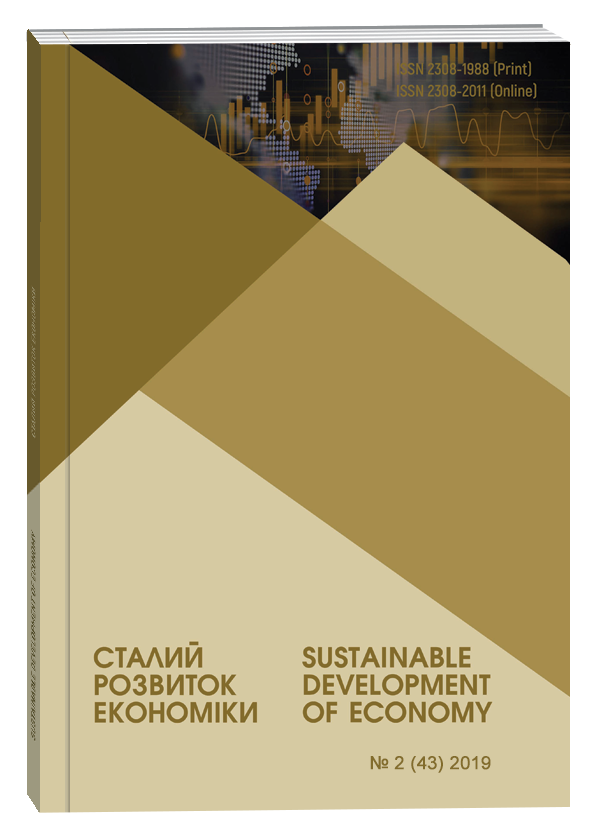FEATURES OF INTRODUCTION OF MANAGEMENT ACCOUNTING AT THE ENTERPRISE
Abstract
Purpose. The aim of the article is to substantiate the need for managerial accounting and the basic principles of building its system at the enterprise in order to ensure effective functioning. Methodology of research. General scientific and special methods are used in the process of research, in particular: the analytical method is used in the review of regulatory and legal sources; the classification method has made it possible to differentiate the main components of managerial accounting, and the description method gives them a detailed description; the monographic method is used in the study of literary sources on managerial accounting; system and analytical method is applied – when processing the information received. Findings. Approaches to the definition of the essence of management accounting are considered, their features are determined, identification characteristics and values for economic activity are substantiated. The classification of management accounting in accordance with the needs of management is generalized and improved. The problems of managerial accounting development are identified. The essence of the notion of managerial accounting is specified. The approach to the estimation of the object of management accounting is offered, the ways of introduction of management accounting at the enterprise are substantiated. Originality. Different approaches to the interpretation of the concept of “managerial accounting” and the relationship between managerial accounting and accounting are shown. The characteristics of accounting and management accounting are presented. The propositions on development of stages of creation of managerial accounting at the enterprise are substantiated. The methodological principles of the management accounting organization have been further improved. Practical value. The variants of introduction and organization of management accounting at the enterprise are considered. The obtained results of the research can be used by business entities in business in the process of using managerial accounting.
References
Upchurch A. Management Accounting: Principles & Practice. London: Financial Times, 1998. 706 p.
Бруханський Р. Ф. Зміна управлінських парадигм як фактор розвитку бухгалтерського обліку: стратегічний аспект. Облік і фінанси. 2014. № 3 (65). С. 15-20.
Garricon R. Management accountings. Homewood: BRI Irwin, 1998. 442 p.
Довжик О. О. Роль управлінського обліку та проблеми його впровадження на підприємствах. Вісник Полтавської державної аграрної академії. 2012. № 2. С. 174-179.
Drury C. Management accounting for business decisions. International Thomson Business Press, 1997. 473 p.
Кузнецова С. А. Бухгалтерський облік в системі формування управлінської інформації: методологія та практика: монографія. Мелітополь: Таврійський державний агротехнологічний університет, 2007. 297 с.
Нападовська Л. В. Управлінський облік. Київ: Книга, 2010. 544 с.
Пушкар М. С. Розробка системи обліку: навчальний посібник. Тернопіль: Карт-бланш, 2003. 198 с.
Шайкан А. В. Бугалтерський облік у прийнятті управлінських стратегічних рішень: монографія. Київ: КНЕУ, 2009. 303 с.
CIMA Official terminology. 2005 Edition. London: CIMA Publishing, 2005. 114 p.
Закон України «Про бухгалтерський облік і фінансову звітність в Україні» від 16.07.99 р. № 996-XI (зі змінами і доповненнями). URL: http://www.ligazakon. ua. (дата звернення 11.02. 2019 року).
Fowzia R. Strategic Management Accounting Techniques: Relationship with Business Strategy and Strategic Effectiveness of Manufacturing Organizations in Bangladesh. World Journal of Management. 2011. Vol. 3. No. 2. P. 54-69.
Simmonds K. Strategic management accounting for pricing: a case example. Accounting and Business Research. 1982. 12 (47), pp. 206–214.
Upchurch, Alan. (1998), Management Accounting: Principles & Practice. Financial Times, London, 706 p.
Brukhanskyi, R.F. (2014), “Changing administrative paradigms as a factor in the development of accounting: the strategic aspect”, Oblik i finansy, no. 3 (65), pp. 15-20.
Garricon, R. (1998), Management accountings. Homewood: BRI Irwin, 442 p.
Dovzhyk, O.O. (2012), “The role of managerial accounting and problems of its implementation at enterprises”, Visnyk Poltavskoi derzhavnoi ahrarnoi akademii, no. 2, pp. 174-179.
Drury, C. Management accounting for business decisions. International Thomson Business Press, 1997. 473 p.
Kuznetsova, S.A. (2007), Bukhhalterskyi oblik v systemi formuvannia upravlinskoi informatsii: metodolohiia ta praktyka [Accounting in the system of formation of managerial information: methodology and practice], Tavriiskyi derzhavnyi ahrotekhnolohichnyi universytet, Melitopol, Ukraine, 297 p.
Napadovska, L.V. (2010), Upravlinskyi oblik [Management accounting], Knyha, Kyiv, Ukraine, 544 p.
Pushkar, M.S. (2003), Rozrobka systemy obliku [Development of an accounting system], Kartblansh, Ternopil, Ukraine, 198 p.
Shaikan, A.V. (2009), Bukhhalterskyi oblik u pryiniatti upravlinskykh stratehichnykh rishe [Accounting in the adoption of managerial strategic decisions], KNEU, Kyiv, Ukraine, 303 p.
CIMA Official terminology (2005), CIMA Publishing, London, UK, 114 p.
The Verkhovna Rada of Ukraine (1999), Pro bukhhalterskyi oblik i finansovu zvitnist v Ukraini [On Accounting and Financial Reporting in Ukraine], Zakon Ukrainy dated 16.07.99 r. no. 996-XI (zi zminamy i dopovnenniamy), available at: http://www.ligazakon. ua. (access date February 11, 2019).
Fowzia, R. (2011), “Strategic Management Accounting Techniques: Relationship with Business Strategy and Strategic Effectiveness of Manufacturing Organizations in Bangladesh”, World Journal of Management, Vol. 3, no. 2, pp. 54-69.
Simmonds, K. (1982), “Strategic management accounting for pricing: a case example”, Accounting and Business Research, 12 (47), pp. 206–214.


